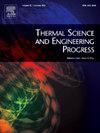Adaptive pre-excitation control of high speed on/off valve for preserving the dynamic performance against temperature effects
IF 5.1
3区 工程技术
Q2 ENERGY & FUELS
引用次数: 0
Abstract
Hydraulic valve control systems are frequently utilized in automatic control systems, where high-speed on/off valves (HSVs) are common control components. The prolonged operation of HSVs inevitably leads to an increase in temperature, which affects their dynamic performance and reduces the reliability of the system. Consequently, an adaptive pre-excitation control algorithm (APECA) is proposed to enhance and maintain the dynamic performance of HSVs across varying temperatures. The variation of dynamic performance with rising temperature is studied both theoretically and experimentally. Subsequently, the pre-opening and pre-closing voltage of the APECA is optimized through current feedback, considering the changes in resistance due to rising temperatures. The dynamic performance of HSVs can be effectively improved while preserving their rapid performance and favorable flow characteristics. For a specific HSV, results indicate that with the APECA, the opening and closing delay times of the HSV are reduced from 1.38 ms to 0.21 ms and 7.7 ms to 0.09 ms, respectively, extending the controllable linear range of flow characteristics from 52 % to 87 %. Furthermore, from room temperature to the maximum thermal equilibrium temperature, the variation range of the total switching time and output flow is maintained within 0.01 ms (0.40 %) and 0.009 L/min (0.83 %), respectively. Therefore, the proposed APECA is effective in improving the response speed of the HSV and enhancing the robustness of the system.
高速开关阀的自适应预激励控制,以保持动态性能不受温度影响
液压阀控制系统经常用于自动控制系统,其中高速开关阀(hsv)是常见的控制元件。hsv长时间运行必然导致温度升高,影响其动态性能,降低系统可靠性。为此,提出了一种自适应预激励控制算法(APECA)来增强和保持hsv在不同温度下的动态性能。从理论和实验两方面研究了动态性能随温度升高的变化规律。随后,考虑到温度升高导致的电阻变化,通过电流反馈优化APECA的预开预关电压。在保持高速性能和良好的流动特性的同时,可以有效地改善hsv的动态性能。结果表明,对于特定的HSV,采用APECA后,HSV的开启和关闭延迟时间分别从1.38 ms减少到0.21 ms和7.7 ms减少到0.09 ms,流动特性的可控线性范围从52%扩大到87%。从室温到最高热平衡温度,总开关时间和输出流量的变化范围分别保持在0.01 ms(0.40%)和0.009 L/min(0.83%)以内。因此,所提出的APECA可以有效地提高HSV的响应速度,增强系统的鲁棒性。
本文章由计算机程序翻译,如有差异,请以英文原文为准。
求助全文
约1分钟内获得全文
求助全文
来源期刊

Thermal Science and Engineering Progress
Chemical Engineering-Fluid Flow and Transfer Processes
CiteScore
7.20
自引率
10.40%
发文量
327
审稿时长
41 days
期刊介绍:
Thermal Science and Engineering Progress (TSEP) publishes original, high-quality research articles that span activities ranging from fundamental scientific research and discussion of the more controversial thermodynamic theories, to developments in thermal engineering that are in many instances examples of the way scientists and engineers are addressing the challenges facing a growing population – smart cities and global warming – maximising thermodynamic efficiencies and minimising all heat losses. It is intended that these will be of current relevance and interest to industry, academia and other practitioners. It is evident that many specialised journals in thermal and, to some extent, in fluid disciplines tend to focus on topics that can be classified as fundamental in nature, or are ‘applied’ and near-market. Thermal Science and Engineering Progress will bridge the gap between these two areas, allowing authors to make an easy choice, should they or a journal editor feel that their papers are ‘out of scope’ when considering other journals. The range of topics covered by Thermal Science and Engineering Progress addresses the rapid rate of development being made in thermal transfer processes as they affect traditional fields, and important growth in the topical research areas of aerospace, thermal biological and medical systems, electronics and nano-technologies, renewable energy systems, food production (including agriculture), and the need to minimise man-made thermal impacts on climate change. Review articles on appropriate topics for TSEP are encouraged, although until TSEP is fully established, these will be limited in number. Before submitting such articles, please contact one of the Editors, or a member of the Editorial Advisory Board with an outline of your proposal and your expertise in the area of your review.
 求助内容:
求助内容: 应助结果提醒方式:
应助结果提醒方式:


